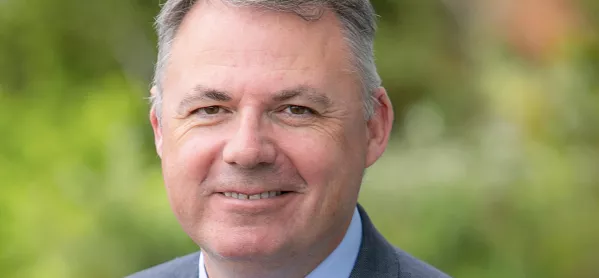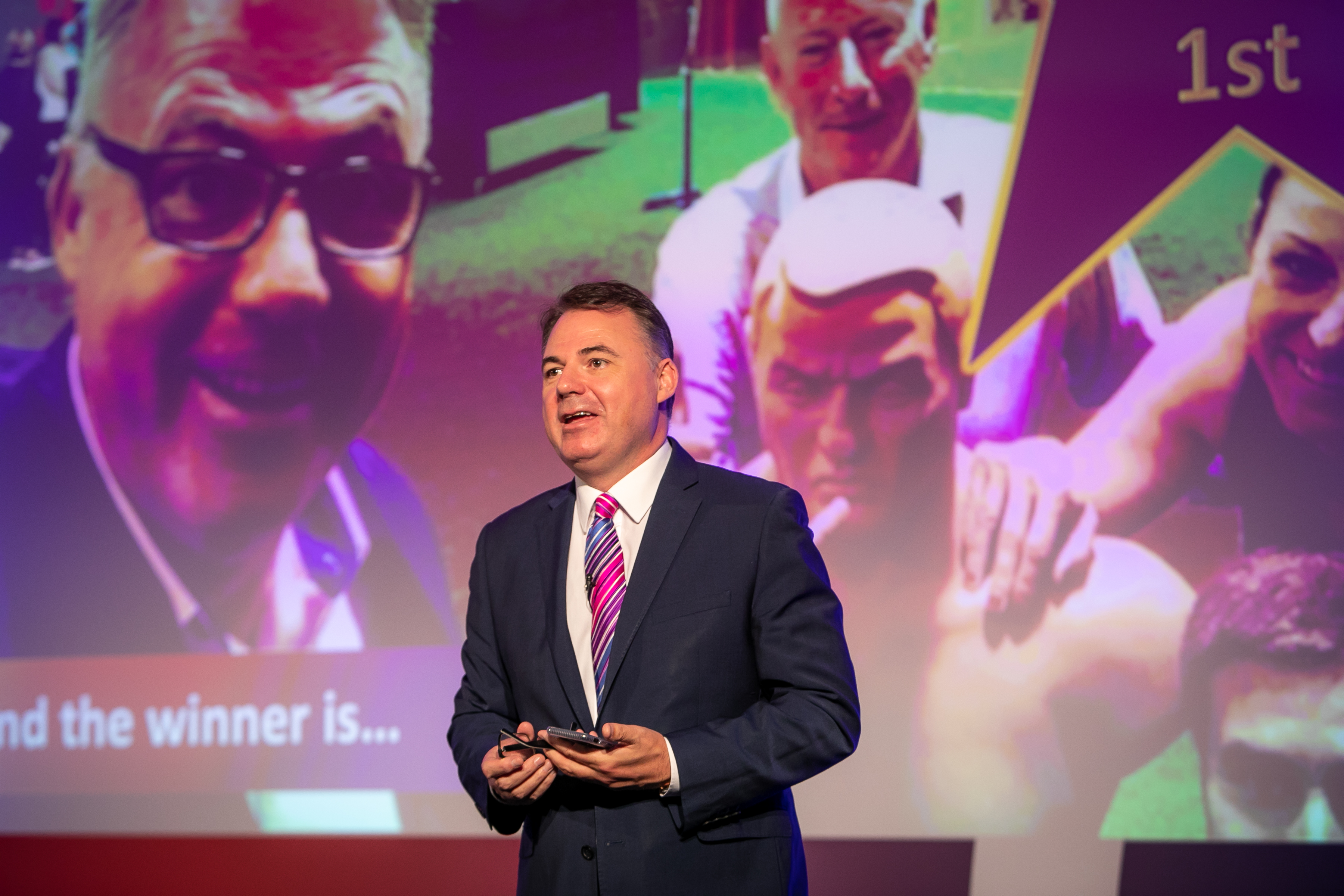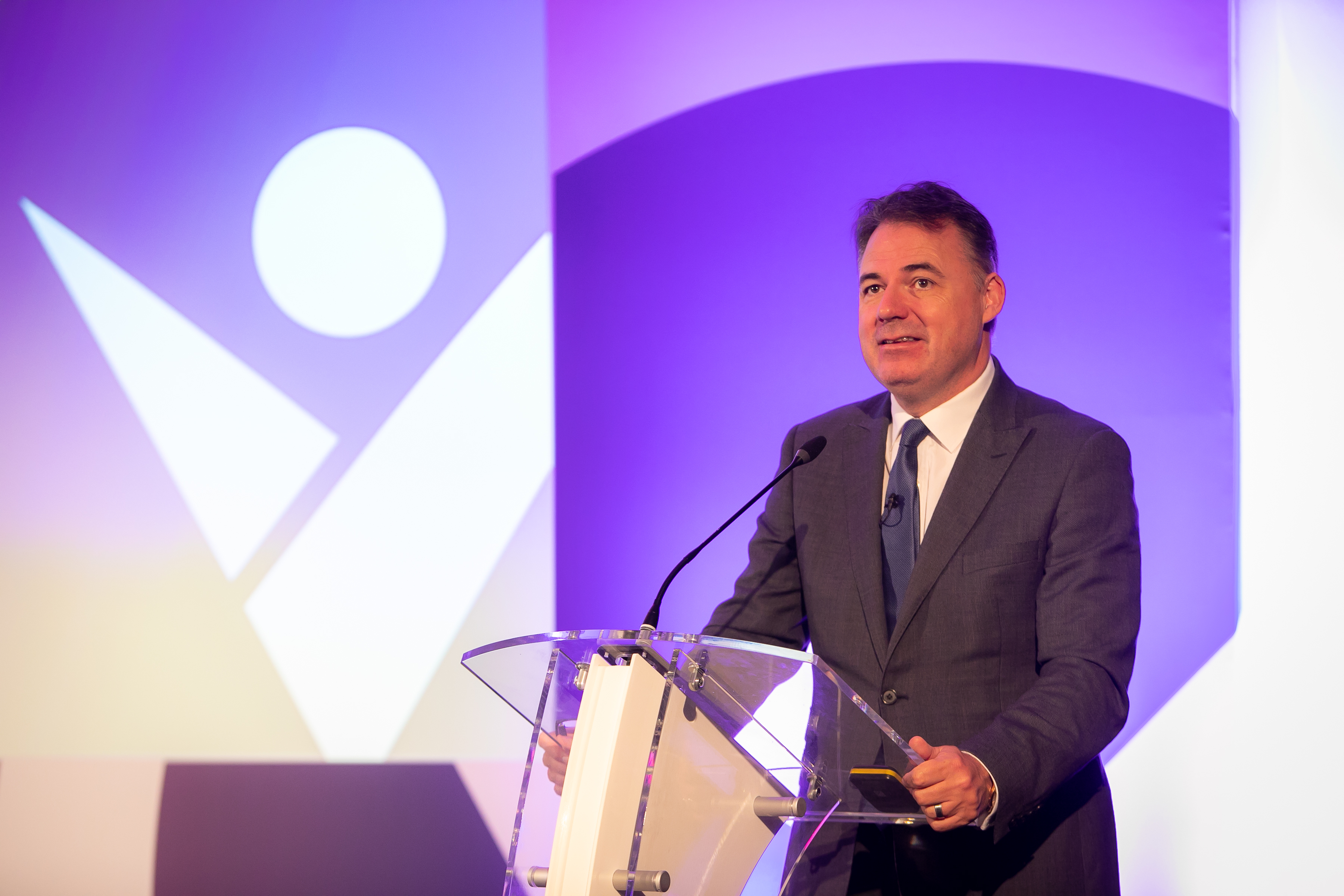- Home
- Tom Bewick: Politician turned awarding bodies champion
Tom Bewick: Politician turned awarding bodies champion

“I describe myself as a failed politician, because I’ve been down that route and I am glad to be out of it, I have to say. But that’s where I’m my own worst enemy, getting involved in big fights,” says Tom Bewick. “That’s been a feature of my personality going right back to school: I’ve always wanted to feel like I’m in the thrust of the action, fighting for something or other.”
2020 has given Bewick a lot to fight for. As the chief executive of the Federation of Awarding Bodies, Bewick has spent most of the year campaigning on behalf of the people he calls “the unsung heroes” of further education: the 20,000 exams and assessment staff working for awarding bodies across the country.
Last summer, the coronavirus pandemic saw the world of assessment flipped on its head when physical exams were cancelled across the country. And it was Bewick’s responsibility to ensure that the voices of those working behind the scenes were heard.
“A lot of my members are the unsung heroes: they are the people who make sure that curriculum is designed in such a way that it is objective and fair and the people who write new examination scripts. They’re the ones working with technology providers on developing new online tools to help with remote invigilation around functional skills,” he says. “None of this stuff is particularly sexy, but without it, the whole system of FE would collapse.”
News: Chancellor to announce new funding for skills
By Tom Bewick: ‘Results day 2020 was like the sinking of the Titanic’
Background: Tom Bewick is the new Federation of Awarding Bodies chief executive
Building resilience
Bewick was born in Coventry in the 1970s, and had a rocky start to life. His parents split up when he was three years old, and initially, he lived with his mother. He says his earliest memory is of his father turning up at his primary school with a black bin bag - his mother was seriously ill, and Bewick’s father had come to take him home with him.
The economic crisis in the 1980s hit close to home for Bewick, and his father lost his job. One thing led to another, and Bewick was placed in care. He says that, as a child, he developed a lot of resilience - skills that he hopes he has passed on to his children.
“With my own children, I’m less concerned about them achieving amazingly well academically. For me, it’s these issues around character, resilience, having an inner sort of moral compass, a passion for life, following your dreams, following your pursuits. These are the kinds of traits that I feel I got from my adverse childhood that have stayed with me.”
Bewick left formal education with one O level and went to work at the local supermarket. He saw his friends go on to the sixth form and local FE college, and decided that he would give education another go, returning to night school to complete five GCSEs. He says that it was that experience that made him realise the power further education can have for those who need a second or third chance.
By the age of 18, Bewick felt constrained by Nuneaton and went to live in Canada as a community volunteer with a charity called the Frontiers Foundation. Things didn’t get off to a great start - he was based in Northern Ontario on a construction project and was hopeless. After a few weeks, he was called into the headquarters and was convinced he was going to be sent home. Instead, he was sent to Northern Alberta to work with teenagers who had been excluded from school.
He says that it was working with these young people, who were from such isolated and poor socioeconomic areas, that he stopped feeling sorry for himself and began to see what his future could be.
“There were lots and lots of challenges and problems there. I stopped feeling sorry for myself at that point because I realised that actually, I had a lot of support as a child, and I’d grown up in a country where isn’t not perfect but on the whole kids who find themselves in those difficulties do get support by the state,” he says.
“In Canada, I encountered shocking levels of poverty, and I really engaged with that. For me, that’s what set me up for a life of wanting to go into politics and community work.”
He was offered a scholarship at the University of Montreal, but ultimately, the calling of home won out. He went on to study social policy at the University of Brighton, before moving to the University of Bath after a year. During his time in higher education, he spent a year at the University of Ljubljana in Slovenia as part of the Erasmus programme. He says that a year of studying European social policy made him “so sceptical of all these quite Stalinist government initiatives from the Department of Education”.
“With the best will in the world, I don’t think civil servants, as well meaning as they may be, can second guess what employers will do, or what individuals want to do. That’s why to this day, I’m probably still a dissident voice in the sector that often pushes against what is, as I see it, a top-down, Whitehall-driven approach to school education policy,” he says.

First foray into politics
In the late 1990s and early 2000s, Bewick found himself working in the Department for Education as a policy officer for education and then adviser to Labour’s minister for adult skills, John Healey. Bewick had been a member of Labour since he’d pushed trolleys at the supermarket when he was 17, and says he “found himself” in his early twenties sitting opposite David Blunkett and Estelle Morris talking about what the new Labour government was going to do for education.
“The irony is that now, people in the Labour Party would say ‘Tom’s right wing’, but when I worked for the Labour Party at Millbank Towers, my nickname was Red Tom - they used to see me as a ‘red under the bed’,” he says.
“I wasn’t seen as fully signed up to the Blairite project. When Tony Blair told me about the intent to charge tuition fees, that caused a massive row. It didn’t sit well with me. The £2,500 grant that I was entitled to when I went to Brighton - that was an absolute lifeline for me.”
Bewick says that when he looks back on that experience, it is “gut wrenching”. He says that until then, he’d been very idealistic about politics, and with the decision to introduce tuition fees, that optimism crumbled.
Ultimately, Bewick left the government and a number of jobs in the skills area followed. He was the director of skills at Thames Gateway, followed by a chief executive role at Creative and Cultural Skills and then another chief executive role at Enterprise UK.
In 2015, he returned to politics as a council member for Brighton and Hove Council. There, he was the lead member for children’s services - having spent his childhood trying to get away from social workers, he found himself overseeing them. To be handed that portfolio, he says, was a surprise.
“I came in and straight away was getting handed one of the most important portfolios in the council. It was quite an honour to do that. It’s a fascinating role to do; it’s 70 schools and you deal with issues that come up from headteachers and school governing bodies.
“Obviously, Brighton and Hove is an interesting place because it’s the only area where you’ve got a lot of people to the left of you, a lot of people to the right, and then you’ve got your own side,” he says.
“What I’ve always tried to be good at - both personally and professionally - is that I really don’t pursue personal attacks or personal agendas with people. I always try to bring it down to the issues. In fact, I’ve always made a point of extending willingness to talk to people who I don’t necessarily agree with.”
The Brexit Party
It’s a skill that came in handy a few years later. In May 2019, Bewick resigned from the Labour Party. The decision, he says, was twofold: it was down to the antisemitism in the party, and the divide over Brexit. Later that year, Bewick ran as an MP for the Brexit Party in Dagenham and Rainham.
“I didn’t get involved in that because I agree with Nigel Farage, and I didn’t get involved in that because I thought immigration was a real problem for the country. In fact, I had my own conversations with Farage where I said to him that I disagreed with him on a lot of those things,” he says.
“But on the issue of upholding the referendum result in 2016, ensuring that the democratic will of the people was delivered and returning the sovereign powers in the areas like making our own rules - for me, that was the principle.”
He says that it came down to a decision about what was important to him - and he recognised that it could mean some sacrifices. And despite the election loss, there are positives he takes from it.
“Ultimately, you have to make this decision about what’s more important to you: is it your political career and those relationships, or is it what you really believe in and what you stand for,” he says.
“Obviously I’ve stood for election and been successful and I’ve stood for election and have been unsuccessful. I take positive experiences out of that because ultimately what you’re having to do is engage on a daily basis with people, and listen to their various concerns. You run a team of people and get them inspired to follow you and support you and work voluntarily every hour God sends. That is an incredibly humbling experience going through and to live through. It means you don’t take people for granted and respect people for what they do.”

The future at FAB
Bewick says that he won’t run for government again. “I’ve got three kids, one who is a teenager, two daughters who will be teenagers, and that feels like a full-time job”, he laughs. And, of course, there is his actual full-time job at FAB, which he calls an honour and a privilege.
Looking at the FE sector and his members’ place in it, Bewick says that the government puts too much focus on qualifications reform and review - and keeps, wrongly, coming back to thinking that qualifications are the source of problem with productivity. What’s actually needed, he says, is a much broader view.
“Anyone who has been FE sector for a decade or more knows that a lot of these perennial problems we’ve been talking about for years, it’s not just about one part of the system not working, it’s the fact that we’ve never looked at post-16 education and training as a skills ecosystem and therefore put in place policies and measures that support an ecosystem,” he says.
“Instead we’ve focused on ‘Oh, it’s because independent training providers are not up to the job’ or ‘If only our FE colleges were more employee responsive’ or ‘If only we had fewer qualifications’. Those are very simplistic ways of looking at what is a very challenging labour market now with Covid and Brexit as well.”
Bewick says that for FAB and his members, it’s all about ensuring that ecosystem as a whole is a success. And he jokes that it’s the politician in him that will help to make that a reality.
“FAB hired me to be that fresh pair of eyes, that critical voice who would come in and have that experience in government and the skills sector. When I went around the country as part of my #loveAO tour, I got lots of selfies - that’s the politician in me, I treat everything like a campaign,” he says.
“Getting around the sector, meeting hundreds of people who are in the engine room of the exams system, that’s what I did. And I’d link my own personal experience and view about resilience to the awarding assessment sector. It’s one of the most resilient parts of our education system.”
Keep reading for just £1 per month
You've reached your limit of free articles this month. Subscribe for £1 per month for three months and get:
- Unlimited access to all Tes magazine content
- Exclusive subscriber-only stories
- Award-winning email newsletters



